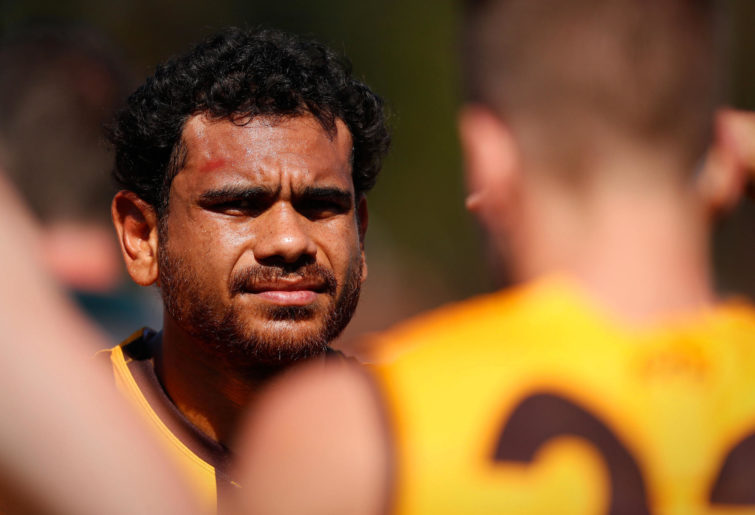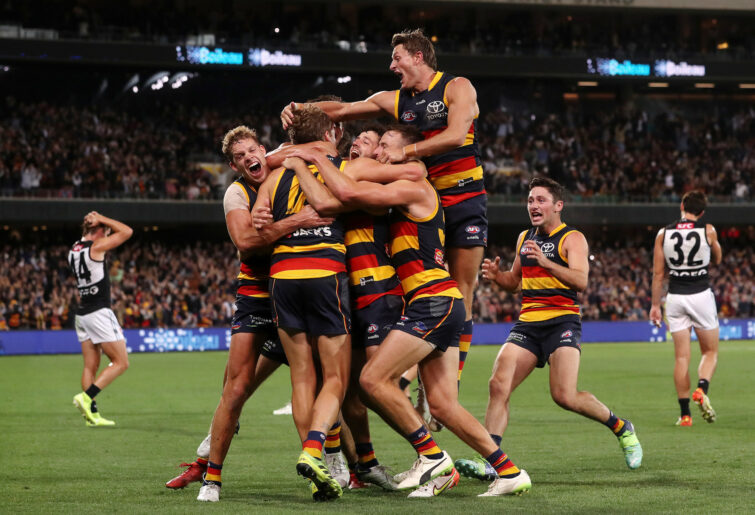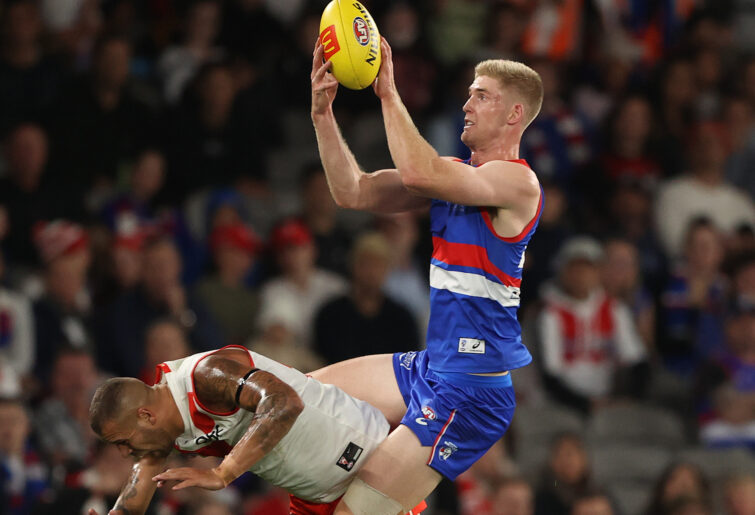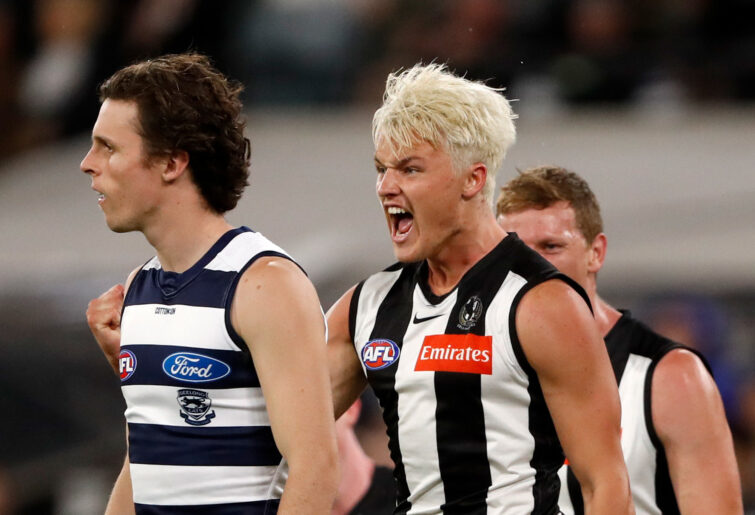Have we ever seen a week of comebacks like this one?
A five-goal lead was no longer safe as teams across the AFL piled on waves of goals, from Adelaide’s stunning Showdown victory at the literal last gasp, all the way through to St Kilda and Max King stunning Richmond with ten straight goals to storm home in Maddie’s Match.
Off the field, it was a weekend dominated by Cyril Rioli’s concerning revelations about alleged racism at Hawthorn, his words sure to have major repercussions in the coming weeks.
Another eventful few days, to be sure – so let’s get into it!
1. Every club needs their own ‘Do Better’ report
Collingwood rightfully attracted criticism in announcing their ‘Do Better’ report in early 2021 – Eddie McGuire’s ‘historic and proud day’ gaffe the most obvious example – but 12 months on, the club remains committed to the change urged by former player Heritier Lumumba.
Now it’s another team’s turn to bear the scrutiny of the football world over racism, Cyril Rioli’s interview with Caroline Wilson painting a concerning picture of his time at the club – and not just for the acrimonious circumstances that prompted his departure.
Most concerning of all might be that it came from Rioli, one of the Hawks’ favourite sons and among the most beloved players to have ever played the game. If a figure as iconic as ‘Junior’ can be so disenchanted with the game as to prompt him to retire at just 28, what of other, lesser Indigenous players around the league?
It would be foolish to assume that this is just a Hawthorn problem, just as it was to lay the blame solely on Collingwood last year. It’s time for the rest of the league to step up and confront the situation proactively, rather than waiting for the first grievances to be aired publicly.
As of right now, no club other than the Magpies has publicly released an investigation into racism within its four walls. It took many years of public pressure, much of it instigated by Lumumba, for the Pies to begin to, well, do better. Whether Hawthorn follow that path remains to be seen.
It’s time for every other AFL club, across the nation, to follow the Magpies’ lead… but release their findings to the public before it’s their turn to be plagued by a public scandal that forces their hand.
For a sport so clearly enhanced by its Indigenous presence, our great shame is the amount of stars, even in recent years, who have been driven from it before their time. First it was Adam Goodes, now we know it was Rioli as well. More will follow unless strong action is taken now.

Cyril Rioli (Photo by Adam Trafford/AFL Media/Getty Images)
2. GOAT vs pioneer: The AFLW grand final is a promoter’s dream
Erin Phillips versus Daisy Pearce. You love to see it.
Of course, next weekend’s AFLW grand final is about more than these two legends – the game will feature many of the cream of the crop of the competition, with 13 All Australian squad members to feature. Ebony Marinoff, Chelsea Randall, Alyssa Bannan… the list goes on.
But the sub-plot of Saturday afternoon at the Adelaide Oval will be whether Pearce, a pioneer and icon of the women’s game, can complete her legend with a maiden AFLW premiership; or whether Phillips, the game’s greatest ever, can enhance hers with flag number three.
Now 33, there is clearly more to life than football for Pearce, a mother of two and well-established expert commentator with Channel 7. She has already been courted by men’s clubs for a coaching role should she decide to venture down that path, though she’ll begin as a coach at the AFLW National Academy.
But it would be a tragedy for us fans if perhaps the most important figure in women’s football, who has been there from before the start and done more than just about anyone to get the AFLW to where it is today, didn’t get the chance to hold the cup aloft.
Just not at the MCG, Tim Gossage.
3. Friday night double-headers can work… if the AFL is smart
I made the point on Friday night, after that incredible Showdown, that the scheduling of the match as a secondary event to the earlier match between Melbourne and Essendon was a travesty.
And it was. But that doesn’t mean the concept of a Friday night double-header doesn’t hold weight.
While a 7:20 start time isn’t ideal on a working day, there was plenty to like for those of us who watched on TV to have a match finish, and still have the second half of another to look forward to. And of course, as we should all know by know, TV viewers are who most of the decisions the AFL makes are designed to benefit.
The NRL has long been an advocate of the Friday night double-header, even starting its early match at the highly inconvenient time of 6pm to accommodate it. While that’s obviously not something the AFL should consider, one element is worth keeping in mind.
That 6pm time is usually one of the weaker games of the round, the equivalent to the AFL’s Sunday twilight timeslot without needing to include one of the Western Australian sides. It’s simple, yet largely effective.
The AFL has the added benefit of the later Western Australian and South Australian time zones, which presents an opportunity to do likewise with a better starting time, especially leading into a Saturday – Super Rugby Pacific do that on occasion with Western Force games.
A 7:30 first bounce for the first game – the marquee game of the round – and then a 10pm start for the second still has its problems – for starters, we’ve still demoted a WA team to second fiddle. But it’s surely better than having two games go head-to-head, especially when it’s a game like the Showdown that gets the rough end of the stick.

Players surround Jordan Dawson of the Crows after kicking the winning goal during Showdown 51. (Photo by Sarah Reed/AFL Photos via Getty Images)
4. Dogs’ free kick frenzy is on other clubs to emulate
The Western Bulldogs’ narrow Thursday night win over Sydney brought with it controversy aplenty. Just about all of it was directed at the free kick count, which ended with a whopping Dogs advantage – 31-14.
For Swans fans, it was enough to trigger flashbacks of the 2016 grand final, another incident where the Dogs comfortably bossed the count. But few other sides around haven’t felt aggrieved by the whistleblowers after a match against the boys from the west.
Unless you believe there’s an AFL-wide conspiracy to help the Bulldogs and that every umpire is in on it – and I don’t think I can help you if you do – then it’s about time we asked the question: why do the Dogs get so many free kicks?
The answer is: they’re the best in the league at not giving free kicks away. In 2021, they conceded the fewest in the league on average by a comfortable margin, while receiving, again on average, fewer than Brisbane, Carlton, Adelaide and Port Adelaide.
Teams which gather a lot of the ball also tend to win lots of frees, and the Dogs fit that description perfectly. They smashed the Swans for contested possessions on Thursday night, another stat which commonly aligns with an improved free kick count.
And yes, they also exaggerate contact more than most, Cody Weightman and Lachie Hunter the prime examples. But every team does this when the opportunity presents – and as we’ll talk about later, every team has one particular player who is infamous for it. Perhaps the Dogs just get more chances to put on a show?
There’s no denying that the Swans copped a few rough decisions – it’s a part of the game – but the narrative around the Dogs’ perpetual dominance with the umpires has reached a point that any game with a free kick discrepancy brings out the #FreeKickBulldogs hashtag, while offering little perspective as to why it’s happened for six years now.
Under Luke Beveridge, the Dogs have constantly played in a way that receives the lion’s share of the frees. If other clubs want to address it, then uncovering their secrets and copying their ways seems like the best way to go.
That is, if you believe that the umps can decide a game.

Tim English marks over Lance Franklin. (Photo by Robert Cianflone/Getty Images)
5. Sorry North, but slow rebuilds don’t cut the mustard anymore
It was hard to watch the respective performances of North Melbourne and Hawthorn in Round 3 without reminiscing on where these two sides were less than 12 months ago.
Both were in varying states of shambles when they locked horns in Tasmania in Round 9, 2021, with the Roos coming from 22 points behind at half time to win by seven in a nail-biting finish. After a horrid start to his coaching tenure, it was David Noble’s first win at the helm.
Sixteen games later, two sides which seemed side by side in mediocrity back then couldn’t be further apart.
The Hawks took it right up to the hottest ticket in town, Carlton, with an electrifying second half on Sunday afternoon, and their eventual one-point defeat could easily have swung the other way with a bit of luck. Despite a developing midfield, new coach Sam Mitchell has instantly galvanised the defence, restricting an ultra-threatening Blues attack to just 11 goals from 64 inside-50s; while the forward line is efficient enough to match that mark from 18 fewer entries.
Less than 24 hours earlier, the Roos had put in the year’s most abject performance to date against an admittedly awesome Brisbane, conceding seven goals in the first quarter, nine in the last and barely firing a shot in between. Making it all the more abject, another struggler from last season in Collingwood was engaging in an epic tussle with a reigning preliminary finalist on the other channel.
David Noble fumed after the game, describing the performance as ’embarrassing’ and flagging harsh consequences for the 22 involved. But it’s hard not to wonder why the Roos have been incapable of the sort of turnaround seen at the Hawks this year, most people’s tip for the wooden spoon heading in.
Yes, they were missing stars Luke Davies-Uniacke and Tarryn Thomas which depleted their midfield even further, but the hammering they received in every statistical category – even the tackle count – was inexcusable.
On paper, the Roos’ team looks good – good enough to avoid the sort of rock-bottom performances that peppered the first half of last year, and was again on display tonight. They have key defensive stocks in Ben McKay and Josh Walker around the experience of Jack Ziebell and Aaron Hall,
Perhaps the reason is that everyone at the club has resigned themselves to a slow, patient rebuild, and have accordingly given themselves time before they need to get serious. That’s the go-to path for many a struggling team in years gone by, from Melbourne in the early 2010s, to Brisbane at the same time, to St Kilda a few years later.
Few of those plans, however, ended well. Melbourne won the flag last year, but had to wallow through a decade of disgrace to reach the promised land. St Kilda were stuck in mid-table mediocrity for years before deciding to recruit a bunch of players from other clubs at the end of 2019, which led to a finals berth. You could say the same of Carlton through any number of their own rebuilds.
Then there’s the teams that opted for instant success, despite seemingly limited squads to work with. The Hawks are just the latest example: the Western Bulldogs in Luke Beveridge’s first year of 2015 made finals despite being a wooden spoon frontrunner in the pre-season, while Port Adelaide did likewise under Ken Hinkley in 2013. One of them even claimed a flag a year later.
Surely it’s clear now that no team is bad enough to not push for instant success. It’s about time the Roos stopped thinking about years down the track, and did something about what remains a painful present.
6. The AFL needs the serial pest
Collingwood youngster Jack Ginnivan might have the rare distinction of having generated more headlines than he’s played games.
Why? Because the eight-game goalsneak has joined the ranks of the AFL’s most hated figures – the serial pest.
The AFL has always had players that you love to hate – usually forwards, usually small, always annoying. Think Stephen Milne, Hayden Ballantyne, Jeff Farmer (for Melbourne fans anyway), Alan Didak. Met with jeers from opposition supporters and cheers from their own wherever they go, the pantomime villain adds an extra dimension to a sport that is often bemoaned for having given way to ‘robot’ personalities.
That’s why Kane Cornes’ repeated attacks on Ginnivan in recent weeks – from staging for free kicks, to carrying on with a GoPro after wins – aren’t just his usual blend of spicy hot takes. They’re an affront to a time-honoured tradition of footy. See, Kane? I can do it too!
It’s not just Ginnivan, either. Think Cody Weightman at the Bulldogs, Dan Butler at St Kilda, Toby Greene at GWS. Soon, I predict, Josh Rachele from Adelaide will join the group. Look at the floods of Tweets every time one of them even wins a free kick, no matter how clear.
Just as we all have our favourite players, we have our least favourites. They make going to the footy an even more emotional experience – we revel in the failures of these serial pests with Bronx cheers and give them hell when they succeed. To their credit, they cop it on the chin, maybe even feeding on the hate like the Deathless Mother in the latest season of The Witcher.
Without the panto villain, the game would become just that little bit less fun, just that little bit less compelling. And in a time where scoring is low, the biff all but resigned to the past and ticket prices maybe five years away from literally costing you an arm and a leg, it’s something the AFL still needs.

Jack Ginnivan celebrates a goal. (Photo by Dylan Burns/AFL Photos via Getty Images)
Random thoughts
-Turns out Champion Data were right all along – Dylan Moore is elite!
-There’s something sad about seeing one of modern footy’s great rucks in Todd Goldstein finish up as a battling key forward.
-I’ve watched that Jordan Dawson goal nine times and I still find myself thinking he’s pulled it right on every one.
-Max King might be the best second-half player in the game this year. When he learns how to start… look out.
-Sam Mayes belting Lachie Murphy in the last five seconds of the Showdown is in the top ten dumbest things I’ve ever seen.
-Great to see the deliberate behind rule coming out in the Derby (he said, fully expecting to not see it paid again all year).
































































































